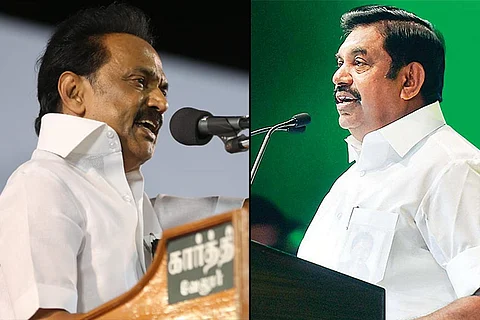

With the seat sharing arrangement of the two major alliances in the state for the upcoming Lok Sabha elections finalised, Tamil Nadu now has a clear picture of where its political parties are contesting from. With 39 parliamentary constituencies in the state and one in Puducherry up for grabs, both the AIADMK-led alliance and the DMK-led alliance have now drawn their battle lines for polling day - April 18. However, a closer look at the seat-sharing arrangement begs the question: In a post-Jayalalithaa, post-Karunanidhi Tamil Nadu, are the two Dravidian foes avoiding a direct contest?
The AIADMK and the DMK are challenging each other in only eight of the 20 constituencies they are fighting from: Chennai South, Kancheepuram(SC), Mayiladuthurai, Nilgiris(SC), Pollachi, Salem, Tirunelveli and Tiruvannamalai.
Speaking to TNM, RK Radhakrishnan, Associate Editor of Frontline observes that the AIADMK alliance had ample time to reflect on its decision since the ruling party announced its seat-sharing arrangement two days after the DMK. “They could have easily contested in all 20 seats, had they wanted to. However, the AIADMK’s lack of confidence is apparent in shying away even from Dindigul, which they have allotted to PMK. The PMK does not even have a base there,” he points out.
On the DMK-led front, Radhakrishnan says, “The DMK has tried to play it safe largely by contesting in northern Tamil Nadu, knowing fully well that they will face off with PMK. That is an easier contest, compared to competing with the AIADMK. The PMK does not have as many resources as the AIADMK.”
Interestingly, the seat-sharing arrangement of the two alliances throws up another surprise for the state: the DMK will face off against the PMK, an alliance partner of the AIADMK in all seven constituencies that it is contesting from. In fact, DMK’s ally VCK will be contesting on the DMK’s rising sun symbol from Villupuram, with Ravikumar taking on the PMK candidate in the reserved constituency.
The Villupuram contest is particularly significant as the PMK, a party which champions the cause of caste Hindu Vanniyars, will be facing off against the VCK, the state’s foremost Dalit and anti-caste party. This, in Villupuram, a district which has seen plenty of caste clashes between Vanniyars and Dalits in recent years.
The PMK-DMK face off also means that the DMK, which has thus far trained its guns primarily on the AIADMK and BJP, will now have to devote a significant amount of attention to the AIADMK’s critic-turned-ally, the PMK. Curiously, the AIADMK is directly competing with the Congress in five seats-- Arani, Karur, Krishnagiri, Theni and Thiruvallur. Meanwhile bitter rivals-- the DMK and the BJP-- will confront each other in Ramanathapuram and Thoothukudi.
“It makes sense for the AIADMK to contest where the Congress or one of the other allied parties contest. They know that the ground strength is not great. The AIADMK's lack of confidence is apparent in the reluctance to conduct local body elections, the distribution of Rs 2,000 special assistance, etc,” observes Radhakrishnan.
On the state’s changed political landscape following the death of former Chief Ministers J Jayalalithaa and Karunanidhi, Radhakrishnan points out that it is advantage DMK. “The AIADMK is in a worse position. There is no identifiable second-rung leadership. Of course, Jayalalithaa and Karunanidhi are not there but at least the DMK has stayed intact. There have been no major defections,” he says.